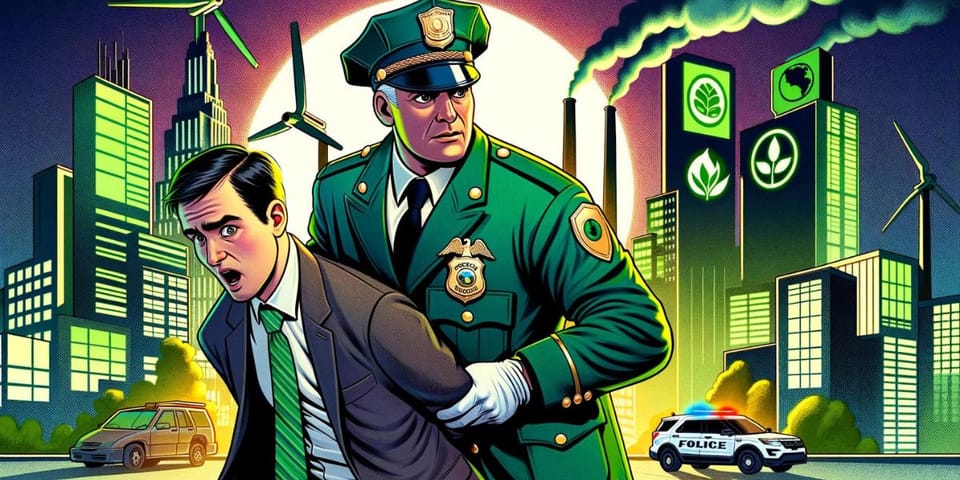Yes, banks are the ‘climate police’. We all are

This is a free preview article. Get three new articles sent to your inbox each week by becoming an 'Unpacking Climate Risk' subscriber. For a limited time, subscriptions are 50% off.
It’s the season for charity and generosity. For forgiveness and redemption. All virtues that I find myself in short supply of after reading UBS boss Sergio Ermotti grouse that banks shouldn’t be thought of as the “climate police” by policymakers, who should do more themselves to incentivize companies to achieve net zero.
He went on to say that financial institutions are “an attractive target for policymakers” that want to “divert at least some of the blame of unpopular decisions to banks.”
Take a bow, Sergio. Your petulance is a wonder to behold.
Look, we are all the climate police. We live in a complex, interconnected world, the entirety of which will be affected by climate change one way or another. We all have a role to play, and we don’t have to wait around for governments to finetune the policy superstructure to get started.
Particularly when you’re the head of a bank managing a US$1.7trn balance sheet, Sergio. You have agency. You’re not helpless. You can use your market power to redirect capital flows and alter corporate incentives. You already do so, choosing to amplify certain businesses and pull back from others to optimize returns based on financial projections and strategies cooked up by your in-house boffins.
And it’s not as though policymakers aren’t clearly signaling the direction of travel. Switzerland has embedded its net zero by 2050 goal into law. Oh, two-thirds of your investment bank exposures are in North America? Perhaps you’ve heard of the Inflation Reduction Act, Sergio, which is incentivizing the greatest acceleration of clean energy development and decarbonization in US history?
Ok, but you respond that UBS’ business isn’t playing quarterback for governments. That your duty is to “represent and protect the interest of our diversified clients.” Fine. So you should be fully behind actions that mitigate risks to those clients and maximize their upside potential. UBS’ own sustainability report, released last week, makes plain addressing climate change is key to achieving this objective:
“In order to protect our clients’ assets and those of our firm from the impacts of climate change and loss of biodiversity, we are focused on managing the risks related to climate and natural capital … [A]t the same time, we recognize that the low-carbon transition also presents consequential opportunities.”
The report goes on to say that managing these risks and opportunities means engaging with clients on their own decarbonization journeys, offering sustainable finance solutions to help them transition, and prioritizing capital “toward lower-carbon activities, or to clients with credible net-zero targets and plans to transition to low-carbon and climate-resilient business models.” The company also has decarbonization targets for high-emitting sectors, including for fossil fuels, energy generation, and iron and steel. This sure sounds to me like the actions of a climate police!
And although, in the grand tradition of obfuscatory corporate communications, UBS does not go so far as to say it will divest from or otherwise sanction borrowers who don’t align with its targets, it may be unavoidable for some sectors – if, indeed, the bank wants to honor its own public commitments.
One wonders if Sergio knows what’s in his own company’s sustainability report, as it seems to contradict his recorded complaints. If, as he says, it should be the responsibility of governments to decide what assets and activities are climate-friendly and which are not, then why does his bank so diligently count up carbon-related assets, exposure to climate-sensitive sectors, and its number of green, sustainability, and sustainability-linked bond deals? UBS has made it its responsibility to know what’s green and not green in its portfolio, and I commend them for it. I wish Sergio would do the same.
Indeed, UBS is actually a standout performer on climate among global banks. Heck, its asset management division has one of the best scores for climate stewardship from influential think tank Lobby Map, and it is lending more to low-carbon entities than to fossil fuel ones. It’s a shame the boss has to make comments that tarnish his bank’s worthy efforts.
One final point. When I first read Sergio’s comments, I couldn’t help thinking of a pivotal scene in The Two Towers, the epic middle installment of the The Lord of the Rings movie trilogy. The hobbit Merry Brandybuck has just heard from a meeting of the mighty Ents that they will not participate in the great fight for the salvation of Middle Earth. The Ent Treebeard says his people “cannot hold back this storm” and that “this is not our war.”
Merry replies:
“But you’re part of this world! Aren’t you? You must help! Please! You must do something.”
UBS is part of this world, and like the rest of us it has to serve as the climate police if it is to survive and thrive.
Member discussion